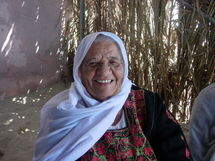|
Gaza
HelpAge International
August 4, 2009
Gaza

An
outing to the sea brought some happiness to Latifa.
Older
men and women affected by the recent war in
Gaza
have been voicing their hopes and fears as part of a programme supported
by HelpAge International.
HelpAge
International's Palestinian partner, the National Agency for Family Care (NAFC),
has been providing food and psychosocial support to older people in Ezbet
Abed Rabo, northern Gaza, with funding from Help the Aged raised
through the UK Disasters Emergency Committee.
The
war in December and January left more than 1,300 people dead, 3,500
injured and 100,000 people displaced. Health facilities, infrastructure
and farmland were damaged and services were disrupted, exacerbating
already difficult conditions arising from years of sustained conflict and
siege.
Lack of services
Older
people in
Gaza
face particular problems. At least 42% of those aged 65 and over live
below the poverty line. Almost half are living with chronic diseases. Yet
few services are directed to older people.
A
needs assessment carried out by NAFC highlighted older people's sense of
isolation, as well as their need for immediate relief and support to
generate an income. NAFC organised food deliveries to 50 displaced older
men and women in Ezbet Abed Rabo, and arranged recreational visits to an
agricultural area and the sea.
Wish for peace
More
than one in five of the older people had lost husbands, wives, children or
grandchildren. Their homes and livelihoods had been destroyed in the war
and they could not afford essentials such as food, clothes, medicine or
shelter.
Their main wish was to have their homes rebuilt and to live in them before
they died, and for their remaining children and grandchildren to have the
freedom to move in and out of
Gaza
. All of them wanted to make the pilgrimage to
Mecca
.
Some spoke of their wish to see children living outside
Palestine
, whom they had not seen for several years because of border closures.
They all said they wanted the project to continue, especially the
recreational days.
"I felt happy"
Latifa,
82, was one of those who took part in the outings. Her home of thirty
years was destroyed in the conflict. Her son's house was also destroyed
and one of her grandchildren died. She now lives in rented accommodation
some distance away.
"My
sons leave me at home alone," she said. "When they go on a trip
with their wives, they don't ask me to come. I had never been to the sea
before! The only happy things after the war have been the trips with NAFC."
Longer-term plans
The
work with NAFC was part of HelpAge International's first programme in
Gaza
. It was one of six short-term projects in different parts of Gaza which
supported older people by providing with medical aids, including glasses,
clearing land for farming, and delivering health services.
HelpAge
International plans to continue working with NAFC to set up community
groups led by older men, who traditionally have a leadership role.
Through
these groups, NAFC will provide livelihoods support, home-based care and
psychosocial support to older men and women, including training younger
people as volunteers. HelpAge International will also help NAFC and
medical relief agency, Merlin, to mainstream older
people in their work.
|



